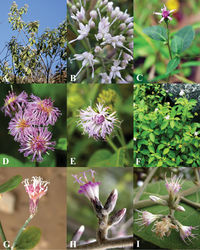Koyamasia calcarea
| Notice: | This page is derived from the original publication listed below, whose author(s) should always be credited. Further contributors may edit and improve the content of this page and, consequently, need to be credited as well (see page history). Any assessment of factual correctness requires a careful review of the original article as well as of subsequent contributions.
If you are uncertain whether your planned contribution is correct or not, we suggest that you use the associated discussion page instead of editing the page directly. This page should be cited as follows (rationale):
Citation formats to copy and paste
BibTeX: @article{Bunwong2014PhytoKeys37, RIS/ Endnote: TY - JOUR Wikipedia/ Citizendium: <ref name="Bunwong2014PhytoKeys37">{{Citation See also the citation download page at the journal. |
Ordo: Asterales
Familia: Asteraceae
Genus: Koyamasia
Name
Koyamasia calcarea (Kitam.) H.Rob., Proc. Biol. Soc. Washington 112(1): 235. 1999. – Wikispecies link – IPNI link – Pensoft Profile
- Camchaya calcarea Kitam., Acta Phytotax. Geobot. 23: 71. 1968.
- Vernonia calcarea (Kitam.) H.Koyama, Bull. Natn. Sci. Mus. Tokyo, Ser. B 29(1): 20. 2003.
Type
Thailand, Chiang Mai, Doi Chiangdao, T. Shimizu, H. Koyama & A. Nalampoon T-10011 (holotype: KYO!). Fig. 9D.
Description
Perennial herbs, 20–80 m tall. Stems erect, conspicuously ribbed, puberulous with stipitate glands. Leaves 10–30 by 3–6 cm, ovate or elliptic, margin serrate, apex acute to acuminate, base attenuate, subcoriaceous, upper surface scabrous without glands, lower surface scabrous with whipshaped hairs, and capitate glands, lateral veins 7–10-paired; petioles up to 6 cm long. Capitulescences terminal, usually solitary. Capitula broadly campanulate, 1.5–3 cm long, pedunculate. Receptacle glabrous. Involucres hemispherical, in 6–7 series, 15–20 mm long, 15–20 mm in diam. Phyllaries imbricate, green or purple, margin entire, outer surface puberulous glandular; the outer and the middle ones ovate to lanceolate, acuminate or aristate, upper half strongly reflexed; the inner ones ovate-lanceolate, apex acute. Florets more than 80, corollas funnelform, purple or white, glandular, corolla tubes 5–6 mm long; corolla lobes 2–3 mm long. Anthers 3–4 mm long, apical appendage acute, base obtuse. Styles purple. Achenes subterete, 3.5–4.5 mm long, 10-ribbed, glabrous. Pappus in 1 series of bristles, 1–3 mm long, deciduous.
Distribution
Thailand: Chiang Mai. Endemic.
Specimens examined
Thailand. Chiang Mai, Chiangdao wildlife sanctuary, 19°26.08'N, 98°53.76'E, 15 Nov 1963, Adisai 611 (BK); Chiangdao wildlife sanctuary, 3 Nov 1922, A.F.G. Kerr 6548 (BM, BK, K); Chiangdao wildlife sanctuary, 27 Oct 1979, T. Shimitzu, H. Toyokuni, H. Koyama, T. Yahara, T. Santisuk & C. Niyomdham T-21121 (L); Chiangdao wildlife sanctuary, T. Shimitzu, H. Toyokuni, H. Koyama, T. Yahara, T. Santisuk & C. Niyomdham T-21128 (L); Chiangdao wildlife sanctuary, 27 Oct 1979, T. Shimitzu, H. Toyokuni, H. Koyama, T. Yahara, T. Santisuk & C. Niyomdham T-21181 (L).
Diagnostic characters
Koyamasia calcarea can be distinguished by its oblong achenes, 3-porate pollen and reflexed phyllaries. Its capitula are also larger than those of Koyamasia curtisii.
Ecology
Restricted to limestone mountain, altitude ca. 1300 m from sea level; flowering October to December.
Vernacular name
Akkanee Thewa (อัคคนีเทวา).
Taxon Treatment
- Bunwong, S; Chantaranothai, P; Keeley, S; 2014: Revisions and key to the Vernonieae (Compositae) of Thailand PhytoKeys, 37: 25-101. doi
Images
|
